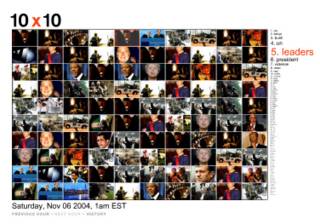
Here's a new and cool info visualization tool (it requires Flash) that we just learned about (thanks J.G.) that comes from Jonathan Harris, the developer of WordCount.org.
The site is called 10x10 and offers an hour by hour "postcard" (updated hourly) based on the 100 most "important" words culled from three RSS news feeds.
The feeds come from:
+ Reuters World News
+ BBC World Edition
+ New York Times International News
Here's how Harris describes 10x10, "Each hour is presented as a picture postcard window, composed of 100 different frames, each of which holds the image of a single moment in time. Clicking on a single frame allows us to peer a bit deeper into the story that lies behind the image. In this way, we can dart in and out of the news, understanding both the individual stories and the ways in which they relate to each other."
10x10's word lists and postcards are built without any human intervention.
Links to archived hourly snapshots and word lists are available (look for the links directly below each snapshot).
More 10x10 user info here and developer info here.
10x10 ('ten by ten') is an interactive exploration of the words and pictures that define the time. The result is an often moving, sometimes shocking, occasionally frivolous, but always fitting snapshot of our world. Every hour, 10x10 collects the 100 words and pictures that matter most on a global scale, and presents them as a single image, taken to encapsulate that moment in time. Over the course of days, months, and years, 10x10 leaves a trail of these hourly statements which, stitched together side by side, form a continuous patchwork tapestry of human life.Via SEWatch, J-Walk blog